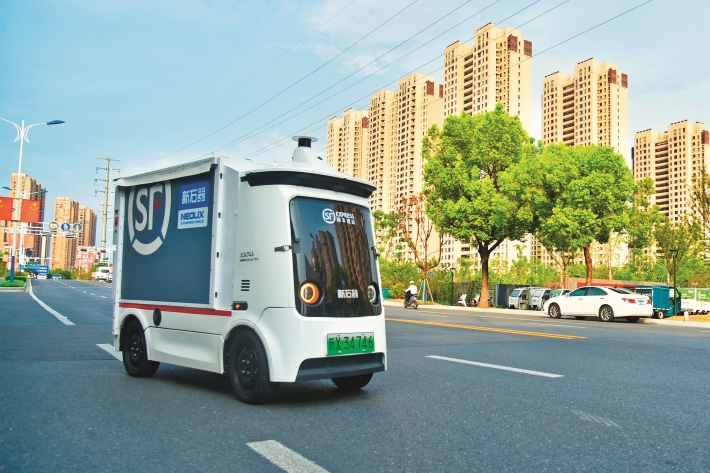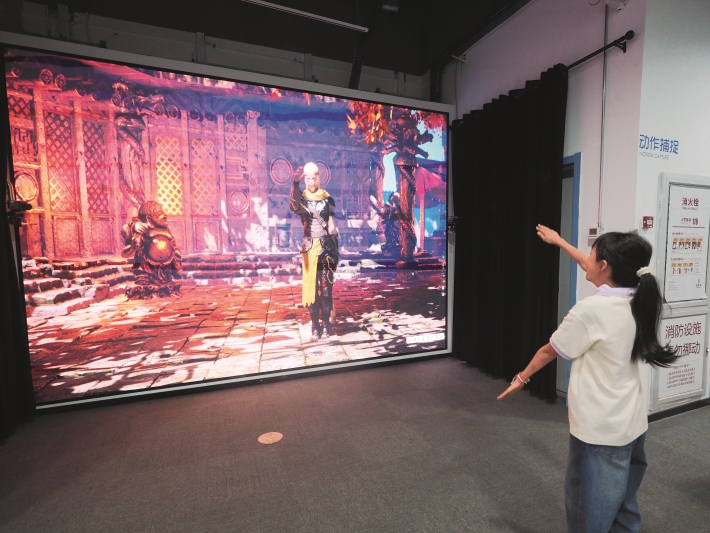|
||||||||||
| Home Top News Economy/Tech Culture/Sports China in Foreign Eyes Green Development Videos Intangible Cultural Heritages |
|
||||||||||
| Home Top News Economy/Tech Culture/Sports China in Foreign Eyes Green Development Videos Intangible Cultural Heritages |
| ChinAfrica |
| Towards Friendly Digital Cities |
| The digital economy is transforming cities into more inclusive, connected, and convivial spaces for urban life |
| By Ge Lijun | VOL. 17 September 2025 ·2025-09-10 |

An autonomous delivery vehicle carries parcels while driving smoothly on city streets in Rugao, Jiangsu Province, 6 August (CNS)
During the 2025 Beijing Digital Economy Experience Week from 27 June to 5 July, interactive projects combining technology and culture - illustrated books created by voice AI, augmented reality tours, and markerless motion capture - attracted many visitors. “More than a dozen themed areas offered the opportunity to dive into new worlds and discover the latest innovations from more than 50 companies,” Lu Yumin, a Beijing resident who visited the event, told ChinAfrica.
The aim of the week, which kicked off the 2025 Global Digital Economy Conference, was to make digital technologies accessible and practical. According to Xu Ran from the Beijing Municipal Bureau of Economy and Information Technology, the “scripted design + IP operation” model allows residents to experience first-hand the changes that digital technology is bringing to daily life and culture.
Against the backdrop of global digital transformation, cities are becoming the driving forces of this change. From 2 to 5 July, experts from home and abroad met in Beijing for the 2025 Global Digital Economy Conference themed “Building Digital-Friendly Cities” with the aim of shaping an inclusive, people-centred digital future.
For Wang Qinmin, director of the National e-Government Expert Committee, building digital-friendly cities relies on a synergy between technological and institutional innovation to create an inclusive, universal and secure digital ecosystem. This represents not only a new path for urban development, but also a theoretical and practical basis for reshaping global governance.

A visitor tests a virtual motion capture system during the 2025 Digital Economy Experience Week in Beijing on 29 June (CNS)
Technology for common good
According to the National Development and Reform Commission, the added value of key industries in the digital economy accounted for 10.4 percent of China’s GDP in 2024, exceeding the 10-percent threshold for the first time. Between 2020 and 2024, this share rose by 2.6 points, which corresponds to an increase of around 6 trillion yuan ($835 billion).
As the third major economic form after agriculture and industry, the digital economy is defined as an emerging economy in which data is the central resource, modern information networks are the most important support and the digital transformation of all production factors is the driving force.
In addition to applications in sectors such as industry and agriculture, the growth of the digital economy is also changing everyday life. In Hebi City in Henan Province, Li Xiangsheng has noticed that his commute to work has become faster.
“In the past, we sometimes had to wait through several cycles of the traffic lights, but now the waiting time is shorter.” The city has optimised its traffic lights by combining data from satellite remote sensing, drones and ground sensors. The traffic lights now adapt their duration to the actual traffic flow and are moving from a system where “people wait for the traffic lights” to a system where “the traffic lights watch people.”
These technologies also improve public services - health care, education, and transport - while increasing resilience in the face of crises and climate change. However, Xu Xinchao, deputy secretary general of the Beijing Municipal Government, pointed out that rapid progress also brings challenges: the digital divide, security and ethics. Beijing’s goal is therefore to become the first digital-friendly city, ensuring that the benefits of technology are shared fairly and safely and that the city becomes more inclusive and sustainable.
According to official figures, the added value of Beijing’s digital economy reached 2.2 trillion yuan ($306 billion) by 2024, accounting for 45 percent of GDP. The “smart connected car” and AI industry clusters have grown rapidly, while the city’s “12345” hotline has a citizen enquiry resolution and satisfaction rate of over 97 percent, highlighting the remarkable results of the city’s digital governance.
At the conference’s main forum themed “Global Dialogue on Building Digital-Friendly Cities” in July, Beijing unveiled the 10 flagship applications of the digital economy, covering areas as diverse as smart governance, digital health, autonomous driving, cultural heritage protection and digital audio-visual media.
“Each of these applications addresses concrete problems that are tangible for citizens. Beijing is using the city as a large laboratory to drive the development of the digital economy - an innovative approach,” said Jiang Guangzhi, director of the Beijing Bureau of Economy and Information Technology. In his opinion, this exploration and these practices have set a new standard for the development of the digital economy in China, while allowing digital technologies to better serve the people and promote urban development.

Children and their parents experience a new ocean-themed immersive virtual reality exhibition at the Shandong Museum in Jinan, Shandong Province, on 17 July (CNS)
International cooperation
Building a digital-friendly city is not only about technological innovation, but also about a profound transformation of urban governance models that sets an example on a global scale.
For Liu Liehong, director of the National Data Administration, the deep integration of industry and the city is the energy source of the digital economy. Digital transformation at the municipal level must focus on practical application and promote this integration so that digital technology can truly serve quality development. It is necessary to enrich and pool urban data resources and reform their dissemination and allocation in order to create a virtuous cycle of innovation.
International cooperation is also crucial. At the conference, Beijing joined hands with more than 40 partner cities from Europe, North America, Asia-Pacific, the Middle East and Latin America to jointly launch the Global Digital Economy Cities Alliance, which focuses on issues such as cross-border data traffic and AI ethics, and aims to promote the joint construction of industrial ecosystems and innovation in digital governance.
Zhang Xiangchen, deputy director general of the World Trade Organisation, points out that global trade in digital services has reached over $4.5 trillion, accounting for 54.2 percent of trade in services. However, the gap between industrialised and developing countries is widening. “We need to create a fairer and more open system of international rules so that the benefits of technology are shared and its development remains focused on the well-being of people,” he argues.
The Global Digital-Friendly Initiative was presented at the conference. It proposed using 10 dimensions, including governance, innovation, green transition and security, to create an inclusive digital development model that follows the principle of “technology for good, people at the centre.” The initiative emphasises attention to the elderly, vulnerable groups, women and children, reducing the digital divide.
For Lluís Soler i Panisello, mayor of Deltebre, Spain, international cooperation is a key lever for the digitalisation of sectors such as tourism and agriculture, and for ensuring that the benefits of the digital economy are shared throughout society.
From the Beijing experience to global cooperation, building digital-friendly cities embodies both a rise in technological capability and a profound change in governance modes. In the future, thanks to the use of data, the coordination of international rules and the equitable diffusion of technology, these cities will help to build more inclusive and resilient smart societies where technological progress promotes human dignity and well-being.
| About Us | Contact Us | Advertise with Us | Subscribe |
| Copyright Beijing Review All rights reserved 京ICP备08005356号-5 京公网安备110102005860号 |